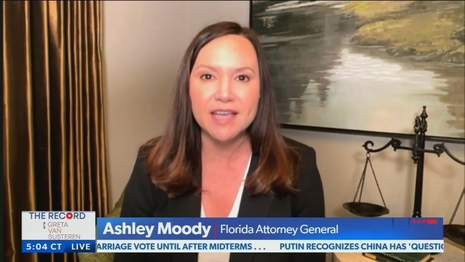 The Supreme Court may consider a Florida law banning social media censorship after the state’s attorney general petitioned the high court for a ruling on the law.
The Supreme Court may consider a Florida law banning social media censorship after the state’s attorney general petitioned the high court for a ruling on the law.
Florida Attorney General Ashley Moody and multiple other Florida officials asked the Supreme Court on Wednesday in a petition to determine if states have the right to regulate how social media platforms moderate content. The debate over pro-free speech Texas and Florida laws could now reach the majority-conservative Supreme Court.
The Florida and Texas laws would forbid social media platforms from censoring certain speech. Courts have issued conflicting rulings on similar laws, with the U.S. Court of Appeals for the Fifth Circuit last week upholding the Texas law.
“That irreconcilable divide warrants this Court’s review,” Moody wrote in the petition. The petition asks the Supreme Court to decide if the First Amendment prohibits states from forcing tech platforms to host speech that they do not wish to host, and if the platforms must explain to users why censorship occurred.
The 11th Circuit Court of Appeals in May struck down provisions of Florida’s law, but after the Fifth Circuit Court’s ruling supporting the similar Texas law, Moody is arguing the decisions are in conflict, and is appealing to the Supreme Court for a resolution.
Reporting on the petition Wednesday, The Washington Post noted that the Supreme Court’s decision could impact elections, given that social media functions as a de facto public square. Big Tech’s actions already affected the 2020 election, as the Media Research Center found in November 2020 that platforms’ censorship of the Hunter Biden laptop story helped steal the election for Joe Biden.
A “torrent of hate speech, misinformation and other violent material” could be allowed online if the Texas and Florida laws are not struck down, The Post squealed. The outlet did not note that what was “misinformation” yesterday is the fact of today. For instance, after labeling the lab leak theory of COVID-19’s origins “conspiracy theory,” leftists later admitted the theory was credible.
University of Chicago Law School professor Genevieve Lakier told The Post, “If these laws are upheld, it’s going to require the platforms to host a lot of speech that they don’t want to host.”
In May 2021, the legal battle over Florida’s law started with NetChoice and the Computer & Communications Industry Association (CCIA) filing a lawsuit to prevent the law from taking effect. Both NetChoice and CCIA are industry groups who represent major tech companies.
Big Tech companies are less private than some originally believed. Recent revelations indicate that tech companies colluded with the federal government to censor COVID-19 content. The Biden White House last week hailed several Big Tech companies’ newly announced initiatives “to limit the spread of hateful rhetoric in coordination with a White House gathering on hate-fueled violence.”
Conservatives are under attack. Contact your representatives and demand that Big Tech be held to account to mirror the First Amendment and provide transparency and an equal footing for conservatives. If you have been censored, contact us using CensorTrack’s contact form, and help us hold Big Tech accountable.





